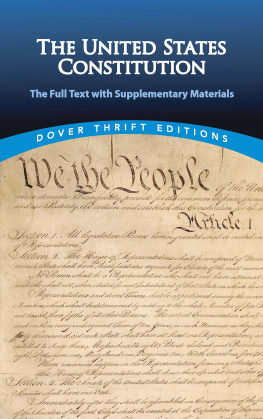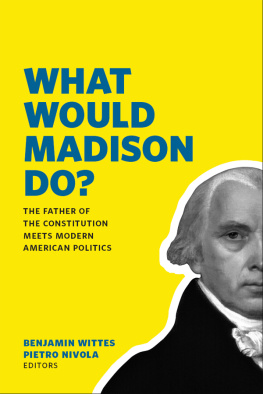Thank you for downloading this Simon & Schuster eBook.
Join our mailing list and get updates on new releases, deals, bonus content and other great books from Simon & Schuster.
C LICK H ERE T O S IGN U P
or visit us online to sign up at
eBookNews.SimonandSchuster.com
CONTENTS
To Nancy
1

T HE E ND OF THE B EGINNING
T he great news reached Philadelphia in November of 1783, when James Madison was packing for home. Britain had signed a peace treaty that recognized American independence, redeeming eight years of bitter sacrifices by the American rebels. They had defeated the most powerful nation on earth and won the right to govern themselves.
Madison and his three million countrymen faced fundamental questions. Could the thirteen states remain united across fifteen hundred miles of Atlantic coast and almost as far into the western forests? Could they maintain a republic in a world of monarchies? Could they avoid anarchy at one extreme and autocratic rule at the other?
The thirty-two-year-old Madison, who was finishing four years as a Virginia delegate to Congress, faced questions of his own. After a spell of ill health and aimlessness as a wealthy graduate of the College of New Jersey (now Princeton), he had found purpose in the Revolution. A month with his county militia in 1775 established that the bookish Virginian was a poor candidate for soldiering. He not only was short and slightno taller than five feet six inches and a bit over one hundred poundsbut also suffered from chronic intestinal woes and fits that resembled epilepsy. He put down his musket and applied his revolutionary ardor to politics. After serving in Virginias provisional government, Madison went to Congress in 1779, still only twenty-eight. Through hard work and talent, he became a central figure in a legislative body crowded with the second-raters.
The past year had been a turbulent one. Madison had lost his heart to Kitty Floyd, the fifteen-year-old daughter of a New York delegate who lived in the same Philadelphia boardinghouse as Madison. He had hoped to marry Kitty and had courted her assiduously. In late April, when the Floyd family journeyed to New Jersey, the infatuated Madison rode sixty miles with them, then returned to Philadelphia.
Madisons public life had also brought disappointments. The new nation could not pay its bills, starting with huge debts to France and to its own citizens. The government created by the Articles of Confederation could impose taxes only with the consent of all thirteen states. Because no tax ever commanded such unanimous support, Congress had to ask the states, politely, to send money to pay for the war, and now for the peace. Voluntary state payments always fell below what was needed, so Congress gasped along on whatever came to hand.
The lack of money ignited a crisis in the winter of 1783. Unpaid soldiers, camped on the Hudson River above New York City, grumbled about mutiny. A delegation of officers carried a petition to Congress in Philadelphia, demanding their back pay. In late February, Madison joined five congressional delegates in a dramatic evening session with the disgruntled soldiers. By the flickering firelight, delegate Alexander Hamilton of New York made dark pronouncements. A former army officer himself, Hamilton warned that some officers aimed to oust George Washington as commander and to remain in arms until they were paid.
Congress made more promises to the soldiers, as did state officials, but they were empty ones. There was no money. It was a recipe for insurrection: an army with no enemy to fight and real grievances against its own government.
In Congress, Madison urged the fractious states to agree on a national tax that would pay the nations soldiers and its debts. Without such action, he predicted, a dissolution of the Union would be inevitable; the southern states would go one way, New England another, the middle states a third, each seeking alliances with European powers. Congress appointed Madison to a committee charged with developing a fiscal solution.
While Congress dithered, one man prevented mutiny. General Washington called an assembly of officers for March 15, the ides of March. For those who knew their Shakespeare, it must have seemed a portentous date.
Standing before his brother officers, Washington recalled sacrifices shared through battle and privation, misery and loss. This was not the time, he said, to open the floodgates of civil discord and deluge our rising empire in blood. It was not his prepared statement, but a theatrical aside, that carried the day. When he began to read a letter aloud, Washington stumbled over the words, then donned a pair of spectacles. Gentlemen, he said. You must pardon me. I have grown gray in your service and now find myself growing blind. Some wept. Most were ashamed. All were moved. The mutiny dissolved with a unanimous resolution supporting Washington.
In the breathing space won by the general, Madison concocted a plan. It was a political hodgepodge. He proposed a twenty-five-year import tax that was set too low to pay off the debt, so he wishfully assumed that states would continue to contribute money to the national government, plus additional revenues from the sale of western lands. In a closing exhortation, Madison argued that through this plan the cause of liberty will acquire a dignity and luster which it has never yet enjoyed. Continued drift, he warned, would mean the failure of the last and fairest experiment in favor of the rights of human nature.
Six weeks later, Washington echoed Madisons appeal in his own Circular Letter of Farewell to the Army. The states actions on the national tax would determine, he wrote, whether the Revolution must ultimately be considered... a blessing or a curse, not to the present age alone, for with our fate will the destiny of unborn millions be involved.
Neither appeal worked. Virginia, home to both Madison and Washington, refused to adopt the plan, killing it outright. Worse was coming.
Within days of Washingtons circular, disgruntled Pennsylvania soldiers surrounded Philadelphias State House, where Congress was sitting, and demanded their back pay. When Pennsylvanias governor refused to call out his states militia to oppose the mutineers, the congressional delegates fled, resolving to reconvene in tiny Princeton, New Jersey.
Although Madison had spent three happy years in Princeton as a student, he despised it as the nations temporary capital. He was depressed by the spectacle of Congress cowering in a remote village to escape its own soldiers. The room he shared with another Virginian measured not more than 10 square feet. For one roommate to dress, the other had to remain in the single bed. The only position available for writing scarcely admits the use of any of my limbs. On top of the rejection by Kitty Floyd, his world was turning bleak.
For the first time in his career, Madison began to play hooky. He
Madison was changing his focus. With the end of the war and the end of his congressional term, he was lifting his gaze from the daily struggles in Congress to the largest challenge facing Americans: whether they could create a government that preserved the Revolutions exhilarating ideals yet functioned effectively. This would be the work of his life.
For the next three decades, Madisons contributions to his country would be incomparable. Without Madison, the Constitutional Convention of 1787 might never have happened. But for him, that gathering could have ended in failure. He led the difficult fight to ratify the Constitution, then a lonely crusade for the Bill of Rights. In the first months of the new government in 1789, it was Madison who advised President Washington on the critical decisions and legislation that established the new republic on a solid footing. When political conflict began to tear the infant nation apart in the 1790s, Madison joined with Thomas Jefferson to form the first true political party and steer it to a position of dominance. And when the republic faced its first foreign war, the profoundly unmilitary Madison, as Americas first war president, unsteadily coaxed an unprepared nation to a surprisingly satisfactory peace and a flowering prosperity.







